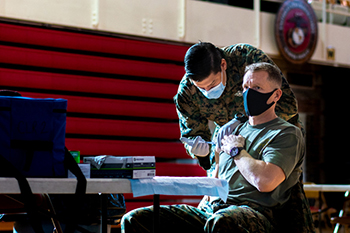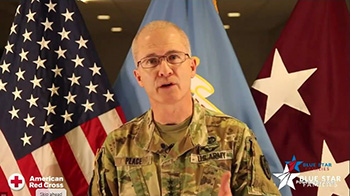 Marine Corps Col. George Markert, Chief of Staff of 2nd Marine Logistics Group, receives the Pfizer-BioNTech COVID-19 vaccine on Camp Lejeune, North Carolina, January 28, 2021. Senior leaders of 2nd MLG volunteered to get the vaccine to lead from the front while showing confidence in the safety and efficacy of the vaccination effort. (Photo by Marine Corps Cpl. Rachel Young-Porter, 2nd Marine Logistics Group.)
Marine Corps Col. George Markert, Chief of Staff of 2nd Marine Logistics Group, receives the Pfizer-BioNTech COVID-19 vaccine on Camp Lejeune, North Carolina, January 28, 2021. Senior leaders of 2nd MLG volunteered to get the vaccine to lead from the front while showing confidence in the safety and efficacy of the vaccination effort. (Photo by Marine Corps Cpl. Rachel Young-Porter, 2nd Marine Logistics Group.)
"We both encourage you to consult your primary-care physician to address any concerns ... so you can be well-equipped to make the right decision for you and your family," Milley said. "Protect yourself, protect your families and protect our communities. Together, we can all lead the way for the nation in the fight against COVID-19."
The global and historic respiratory pandemic is the first in the United States in 102 years, Fauci said. It has killed more than 2 million people worldwide, infected more than 20 million U.S. people, and left about 430,000 dead.
Fauci also said that while the virus appears to be plateauing, the nation is still in its grips. There are still between 100,000 and 200,000 new cases each day and 3,000 to 4,000 deaths per day.
The vaccine development has met significant success with 32 million injections being administered, so far, Fauci said.
Late yesterday, Johnson & Johnson became the third company to receive an emergency use authorization for a new vaccine. Moderna and Pfizer received authorizations for their vaccines in December, and both are being administered across the country.
The Moderna and Pfizer vaccines offer 94% to 95% effectiveness from developing COVID-19 and thwart nearly 100% of severe disease leading to death, Fauci said.
The Johnson & Johnson vaccine had not received emergency use authorization when Fauci made his remarks.
"The results are extraordinary," he said.
Fauci fielded questions and debunked myths from those who fear the vaccine was developed too quickly to be safe and that corners were cut to make it available.
The speed of the vaccine's development is due to extraordinary technological advances that go back 10 years, he said, adding that neither safety nor scientific integrity was sacrificed. He urged people to get the vaccine, especially those who are at increased risk because they are immunocompromised due to chronic disease.
"If you look at the safety of any vaccine, the risk-to-benefit ratio for safety is about the same [as the COVID vaccine]," he said, adding that allergic reactions to getting the vaccine are rare.
 During the virtual presentation, Army Lt. Gen. (Dr.) Ronald J. Place, director of the Defense Health Agency, explained how the agency and military medical treatment facilities are supporting the national effort to combat the COVID-19 pandemic. (Photo by Jacob Moore, MHS Communications.)
During the virtual presentation, Army Lt. Gen. (Dr.) Ronald J. Place, director of the Defense Health Agency, explained how the agency and military medical treatment facilities are supporting the national effort to combat the COVID-19 pandemic. (Photo by Jacob Moore, MHS Communications.)
The vaccines by Pfizer and Moderna that are now available are for people 18 and older, although Fauci said trials are beginning for certain younger age groups and pregnant women. He also said babies in utero will receive the vaccine antibodies from the mother, and infants will receive them from moms who breastfeed.
Fauci said it is impossible to get COVID-19 from the vaccine, and it will "absolutely not" enter into a person's DNA.
Instead, the vaccine comprises messenger-RNA, Fauci said.
"RNA [ribonucleic acid] is the general molecular mechanism where we make all of the proteins and cells in our body. mRNA — the 'm' stands for messenger — is a message to tell the body to make a protein. When you get an mRNA vaccine, you stick in the coding sequence to make one of the components of COVID, which is called the spike protein," he said. "And the spike protein is the part that sticks out from the virus, which makes it look like a crown. When the mRNA codes for that protein [are injected] into your muscle, it starts to code for protein, and the body sees the spike protein and thinks it's the virus. But it's not the virus. It's one harmless component of the virus."
Fauci said when the real virus tries to enter your body, you have a bunch of proteins called antibodies that jump all over that virus and prevent it from infecting you.
"And that's the reason why many of you hear me every day in the media saying when your turn comes up, please get vaccinated — both for your own safety and for that of your family and for the American community in general," Fauci said.
The Defense Health Agency director said service members and their family members 18 and older have some options for where to get the vaccine. Military treatment facilities and community resources — such as state, county and local outlets — can provide it.
"We're doing several things," Place said. "We're encouraging individuals to get vaccine [information] like this discussion today. We're directing people to their state, county and local resources. We're working with our health care contractors to ensure communication flows from individual providers to their patients. And we're reaching out through military service organizations … to help steer families in the right direction."
By attending the webinar, Place said, audience members are educated as ambassadors to share what they've learned. "I hope you share what you hear today with others," because data show the likelihood of individuals receiving this vaccine and sharing their experiences have a statistically significant effect on the likelihood of family, friends and colleagues deciding to get the vaccine, he said.
"For almost 12 long months, we've been in this — bound together — and the only way out of it is together," Place said.